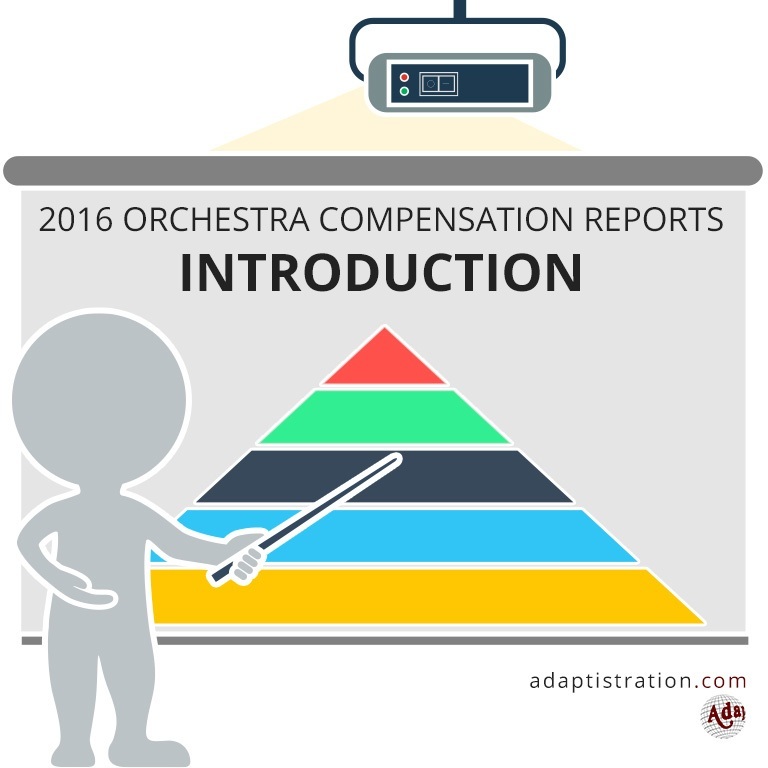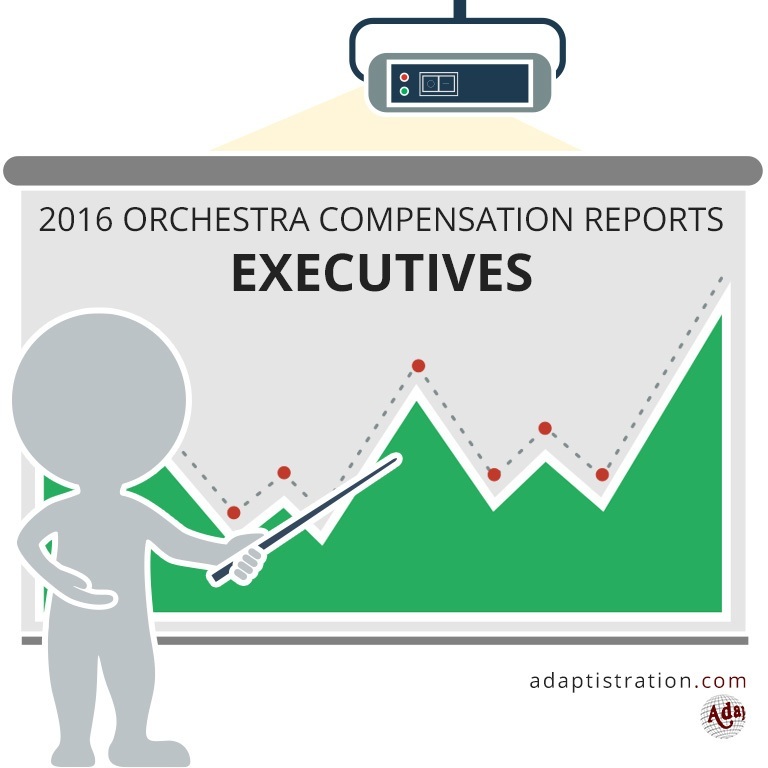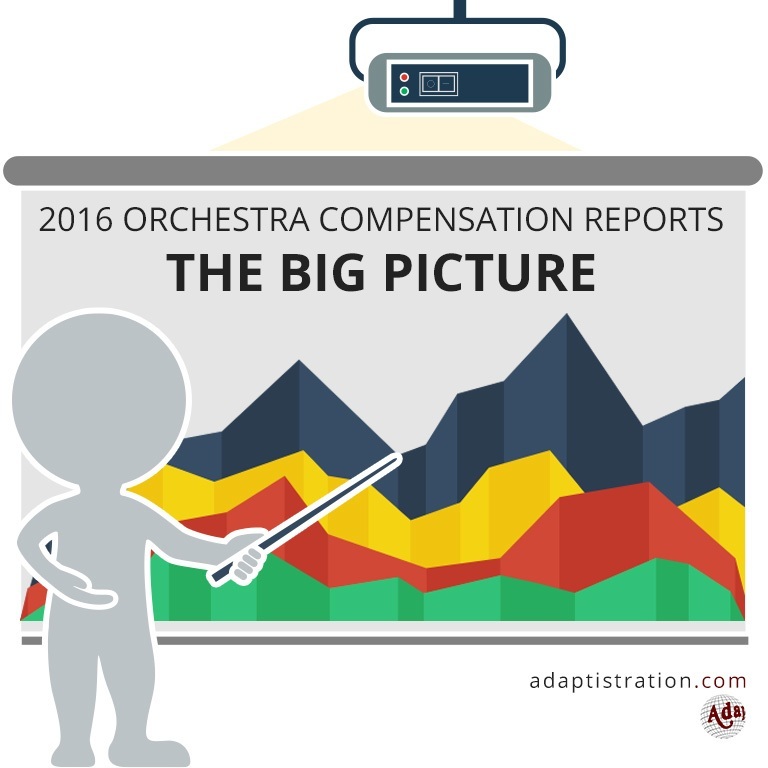![]() For the average music director, the 2011/12 season was a good year financially and from a historical perspective, it was the first time that average annual compensation broke the half-million threshold ($517,649 to be precise). Although a few high profile positions left vacant brought the average increase down from previous seasons, most music directors saw their earnings increase by at least 2.46 percent.
For the average music director, the 2011/12 season was a good year financially and from a historical perspective, it was the first time that average annual compensation broke the half-million threshold ($517,649 to be precise). Although a few high profile positions left vacant brought the average increase down from previous seasons, most music directors saw their earnings increase by at least 2.46 percent.
The Data
In order to provide information that is as accurate as possible, data from the 2011/12 season is gathered from the following sources:
- Music Director compensation figures were obtained from their respective orchestra’s IRS Form 990 for the 2011/12 concert season.
- Total Expenditures were also obtained from each respective orchestra’s IRS Form 990 for the 2011/12 concert season.
Adaptistration makes no claim to the accuracy of information from documents compiled or reported by external sources. If you have reason to believe any of the information is inaccurate or has changed since reported in any of the above sources and you can provide documentation to such effect, please feel free to use the following form to submit a notice.
What The Data Doesn’t Show
It is important to remember that the numbers shown do not always convey a complete compensation picture. For example, a music director may have had a large increase in salary because they were leaving a position and per terms of their contract they may have received a sizeable severance or deferred compensation package. As such, the cumulative compensation may artificially inflate annual earnings. Furthermore, these figures may not reflect bonuses or other incentive payments, therefore underreporting what conductors may actually earn.
Also missing from the figures are expense accounts, lodging expenses, and other perks; as such, the cumulative compensation for music directors may or may not be more than what is listed. Additionally, the documents used to gather data do not indicate how much of the season an individual received a salary. As such, excessive adjustments in the percentage change from the previous season’s compensation may be artificially adjusted. Although the music director compensation figures include the combined amounts reported as what the IRS classifies as “compensation” and “contributions to employee benefit plans & deferred compensation,” each orchestra does not always report figures for the latter category.
How Terms Impact Compensation
Unlike executives, concertmasters, and musicians, music directors are sometimes employed as private contractors. In these cases, orchestras will list the music director among the five highest paid private contractors as opposed to sections devoted to employee compensation. In most of these instances, no information about benefits or deferred compensation is available.
Likewise, some music directors receive separate payments for duties associated with their position. For example, for several fiscal years the Seattle Symphony Orchestra paid Gerard Schwarz via two separate private contractor listings: once for music director duties and the other for principal conducting duties. At the Chicago Symphony Orchestra, when Daniel Barenboim was with the organization, he was often paid separately for services music director and then again as conductor and soloist.
In instances such as these, those figures have been combined into a single figure in the table below. For details about each individual conductor’s compensation, please consult the orchestra’s respective IRS Form 990.
A New Trend
One unusual occurrence in the 2011/12 season was an uptick in the practice of a paying music director part of his/her compensation as a private contractor and part as an employee. This is a bit different than the scenarios listed above in that there is no distinction regarding which duties and responsibilities were assigned to both types of compensation. As of this season, it was limited to three organizations (Baltimore, Chicago, and Kansas City) but it will be interesting to see if this trend continues.
2011/12 Season Music Director Compensation
An Alarming Practice: Orchestras Refusing To Disclose Compensation
When the orchestra compensation reports started nearly a decade ago, the majority of organizations had no problem listing music director compensation. There were always a few exceptions to the rule, let’s call it habitual omission disease (I’m looking at you Spokane and Elgin) but even those groups would release the information when contacted. Every now and then a group attempts to push back against requests for information but unquestionably, the lion’s share of organizations have actively engaged in a policy of transparency that remains true to the intent of the rules governing nonprofit compensation reporting.
Unfortunately, this ethical practice is slowly eroding and this year’s music director report witnessed what is, to date, the most egregious violation to the field’s long standing routine of transparency. Specifically, this infraction involves the Detroit Symphony Orchestra and their decision to refuse requests for music director compensation figures for Leonard Slatkin during the 2011/12 season. Details continue to unfold but you can be certain that this will be examined in considerably more detail next week once the reports have concluded.




According to http://projects.propublica.org/nonprofits/organizations/910730435, Spokane has $186,179 in 2011 allocated for executive pay, which I believe to be split between the executive director and the music director. While we cannot come up with a specific number, we have an educated guess.
Other comments I have about the organization – well, that’s another blog post.
Just out of curiosity, what are the criteria for an orchestra to appear on your list? i.e. budget over a certain amount?
Excellent question: all of the groups included in the reports must have at least $2mil listed in Total Expenditures (which is a bit different than traditional “budget” figures), maintain a collective bargaining agreement, and have their musicians be a member of ROPA, ICSOM, or IGSOBM. A couple of groups from last year were cut out this season because their total expenditure figures dipped below the $2mil threshold (Fresno, Delaware, Louisville, and Orchestra Iowa).
Certainly not a reflection of orchestra performance standards and quality. Example: Cincinnati outperforms all but a handful of the orchestras on this list (and on a good night is untouchable) but the music director pay is rather modest relatively speaking.
As one of the Big Five, the omission of Boston seems rather significant. Between the importance of the role, the wealth (cf. San Francisco) and the incumbent’s tenure, I would expect Ozawa to be top 5 if not top 3 in compensation. (Unless of course he’s being compensated in other ways, such as recording royalties). Is Boston a chronic offender, or did they just leave off the number this year?
Ozawa???
You beat me to the punch…
Why is the Fort Wayne Philharmonic included but not the Reading Symphony Orchestra? They share the same Music Director after all. Does the RSO truly fall outside your specifications or is it an accidental omission?
Hi Jessica, thanks for your question. If you haven’t seen the criteria listed above as a reply to an earlier comment, one of the requirements is a $2mil total expenditure figure and for the 2011/12 season, Reading’s TE was approximately $1.3mil.